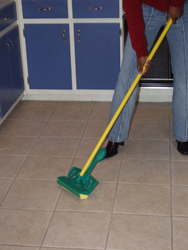
A disinfectant is a chemical substance or compound used to inactivate or destroy microorganisms on inert surfaces. Disinfection does not necessarily kill all microorganisms, especially resistant bacterial spores; it is less effective than sterilization, which is an extreme physical or chemical process that kills all types of life. Disinfectants are generally distinguished from other antimicrobial agents such as antibiotics, which destroy microorganisms within the body, and antiseptics, which destroy microorganisms on living tissue. Disinfectants are also different from biocides—the latter are intended to destroy all forms of life, not just microorganisms. Disinfectants work by destroying the cell wall of microbes or interfering with their metabolism. It is also a form of decontamination, and can be defined as the process whereby physical or chemical methods are used to reduce the amount of pathogenic microorganisms on a surface.
The term cleanser refers to a product that cleans or removes dirt or other substances. A cleanser could be a detergent, and there are many types of cleansers that are produced with a specific objective or focus. For instance, a degreaser or carburetor cleanser used in automotive mechanics for cleaning certain engine and car parts.

Glass Plus is a glass and multi-surface cleaner.

Reckitt Benckiser Group plc, trading as Reckitt, is a British-Dutch multinational consumer goods company headquartered in Slough, England. It is a producer of health, hygiene and nutrition products. The company was formed in March 1999 by the merger of British company Reckitt & Colman plc and Dutch company Benckiser N.V.

Household chemicals are non-food chemicals that are commonly found and used in and around the average household. They are a type of consumer goods, designed particularly to assist cleaning, house and yard maintenance, cooking, pest control and general hygiene purposes often stored in the kitchen or garage.

Ajax is a brand of household cleaning products and detergents made by Colgate-Palmolive. The brand is also licensed by Colgate-Palmolive in the United States, Canada and Puerto Rico.

Dishwashing liquid, also known as dishwashing soap, dish detergent, and dish soap is a detergent used to assist in dishwashing. It is usually a highly-foaming mixture of surfactants with low skin irritation, and is primarily used for hand washing of glasses, plates, cutlery, and cooking utensils in a sink or bowl. In addition to its primary use, dishwashing liquid also has various informal applications, such as for creating bubbles, clothes washing and cleaning oil-affected birds.
Chloroxylenol, also known as para-chloro-meta-xylenol (PCMX), is a chlorine substituted phenol with a white to off-white appearance and a phenolic odor. The discovery of chloroxylenol was the result of efforts to produce improved antiseptics that began at the end of the 1800s. First synthesized in Germany in 1923, it was borne out of the study of coal tar components that began a decade earlier.
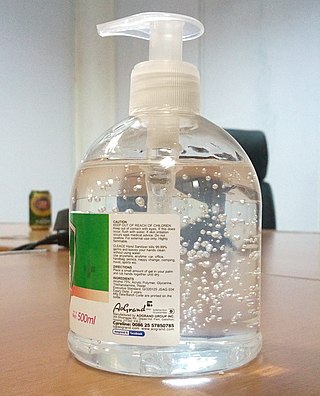
Hand sanitizer is a liquid, gel or foam generally used to kill many viruses/bacteria/microorganisms on the hands. It can also come in the form of a cream, spray, or wipe. In most settings, hand washing with soap and water is generally preferred. Hand sanitizer is less effective at killing certain kinds of germs, such as norovirus and Clostridium difficile, and unlike hand washing, it cannot physically remove harmful chemicals. People may incorrectly wipe off hand sanitizer before it has dried, and some are less effective because their alcohol concentrations are too low.

Lysol is a brand of American cleaning and disinfecting products distributed by Reckitt, which markets the similar Dettol or Sagrotan in other markets. The line includes liquid solutions for hard and soft surfaces, air treatment, and hand washing. The active ingredient in many Lysol products is benzalkonium chloride, but the active ingredient in the Lysol "Power and Free" line is hydrogen peroxide. Lysol has been used since its invention in the late 19th century as a household and industrial cleaning agent, and previously as a medical disinfectant.

Savlon is a brand of antibacterial personal care products with the active ingredients of cetrimide and chlorhexidine gluconate. Commonly sold as a cream, the product range also includes antiseptic sprays, sticking plasters and other antiseptic products.
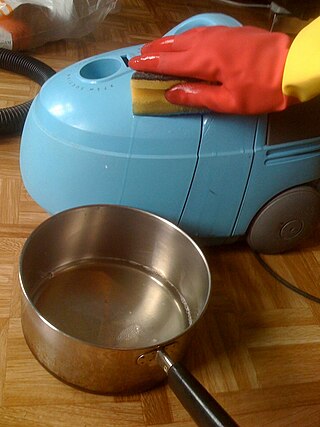
Cleaning agents or hard-surface cleaners are substances used to remove dirt, including dust, stains, foul odors, and clutter on surfaces. Purposes of cleaning agents include health, beauty, removing offensive odor, and avoiding the spread of dirt and contaminants to oneself and others. Some cleaning agents can kill bacteria and clean at the same time. Others, called degreasers, contain organic solvents to help dissolve oils and fats.
A virucide is any physical or chemical agent that deactivates or destroys viruses. The substances are not only virucidal but can be also bactericidal, fungicidal, sporicidal or tuberculocidal.
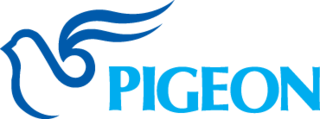
Pigeon Corporation, established in 1978, is a manufacturer of household products. In August 1978, the company created of “Pigeon”, the first fabric softener made in Korea. The company has more than 50% of the Korean market for fabric softeners in Korea.
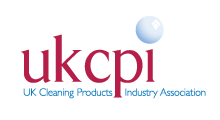
The UK Cleaning Products Industry Association is the leading trade association for companies representing UK producers of cleaning and hygiene products. This includes soaps, washing powders and liquids, household disinfectants, air care and polishes, as well as professional cleaning and hygiene products used in industrial and institutional applications.
Fantastik is an American trademarked brand of cleaning products produced by S. C. Johnson & Son. The company acquired Fantastik as part of a package of products acquired in 1998. These products include: Antibacterial Heavy Duty, Bleach, Antibacterial Lemon Power, Orange Action, Oxy Power, Orange Action Wipes, and Multi-Surface Wipes.

Pledge is a cleaning product made by S. C. Johnson & Son. First sold in 1958, it is used to help dust and clean. Pledge is known as Pliz in France, and Blem in Argentina. In several countries, it is sold as Pronto.
Dettol antiseptic liquid is a product produced by the Dettol Brand for Reckitt. It is light yellow in color in the concentrated form but, as several of the ingredients are insoluble in water, it produces a milky emulsion of oil droplets when diluted with water, exhibiting the ouzo effect. Chloroxylenol comprises 4.8% of the admixture, with pine oil, isopropanol, castor oil, soap and water.













